 |
WEST POLAND CASTLES, PALACES PHOTO GALLERY - PART 2 |
Bill Biega's Photo Collection |
|
Click on any illustration with colored border to see it full size. Then click on "Back" button to return to this page.
Western Poland, Wielkpolska, is where the Polish nation originated. This second part of the photo series covers the area north-east of Poznan, where the earliest prehistoric settlements, such as Biskupin are to be seen. Then we move west of Poznan to the lakelands and national parks in the valley of the Warta river and to the Lubuski lake district. On the map these are itineraries B, D and E.
| IMPORTANT LINKS
Tour of Wielkopolska Photos of Gniezno Photos of Rydzyna Index to tour pages Mark Wojciechowski's photos of Poland, Most of the photos on this page are from that wonderful collection, with permission. Prehistoric Biskupin | |
|
Drive east from Poznan along Highway #2. About 24km, across the railroad tracks, in the small town Gułtowy, we visit the classic, late 18thC., palace of the Bninski family.
10km north we come to Czerniejewo, a larger palace of the same period that belonged to the Skórzewski family. It is now a hotel with a large park. |
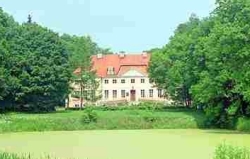
|
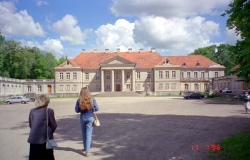
|
|
The site of the birth of Christian Poland, Gniezno, is covered in a separate
gallery .
From Gniezno continue north on highway#5 for about 32km and then right to Biskupin. Discovered in 1933, this remarkably well preserved Iron Age settlement has been partially restored as a museum. |
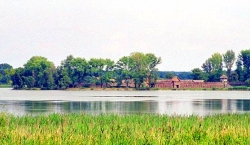
|
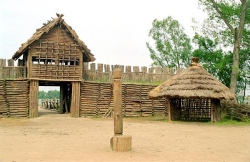
|
|
Close by, on the shore of a beautiful lake, you can see the ruins of a 14thC. castle of the Wenecja (pronounced VEN-ETS-YA).
Then proceed north through the old town Znin with the tower of the 14thC town hall, and a Gothic church from the same era. |
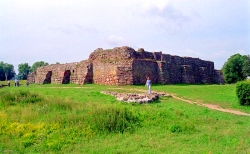
|
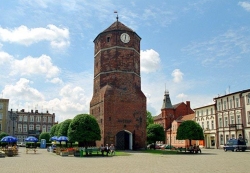
|
|
15km north-east we visit the 18thC. classic palace Lubostron of the Skórzewski family. Of particular interest is the 3-story high reception hall under the dome. An enormous bronze chandelier hangs from the dome.
The palace is located in a 37ha park with three tree-lined avenues. |
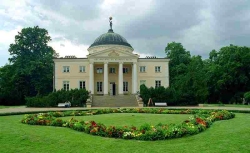
|
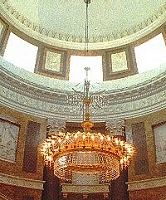
|
| From here you may return to Poznan, or head west to meet itinerary B 32km north-west of Poznan at Szamotuły, where part of the 15thC. Gothic castle has been restored. In Gorzów Wielkopolski the dominating building is the 13thC. brick cathedral. Equally interesting is the 18thC granary on the banks of the river Warta. |
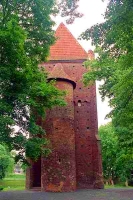
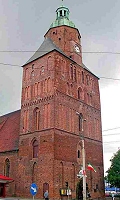
|
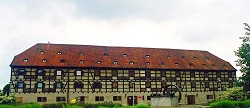
| Continuing south on highway #3 we come to Międzyrzecz with its 15thC. moated castle, built by king Casimir the Great.
You may also view the remains of German WWII underground fortifications. |
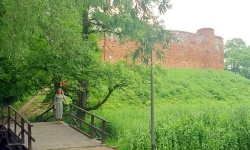
|
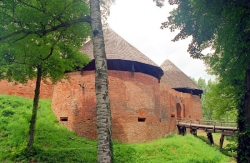
|
|
Just a few kilometers further south, Gościkowo is the site of a 13thC. Cistercian abbey, now housing a seminary with the name Paradyż Most of the buildings have been carefully restored.
There are extensive collections of religious art - altars, frescoes, sculptures. |
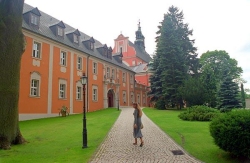
|
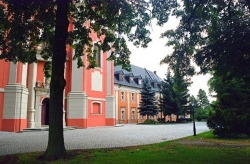
|
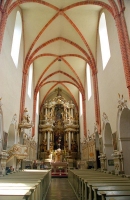
|
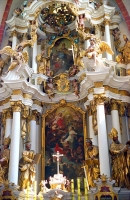
| |
|
Łagów is another great castle built in the 14thC. on a hill overlooking a lake, just a few kilometers west of Goscikowo.
Further south in Sulechów you will see another 14thC. castle, but unfortunately it is in a very poor condition. Some of the town walls are still standing and one of the gates in the Baroque style. However the 17thC. town hall with its tall tower is in excellent condition. |
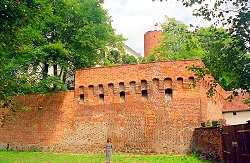
|
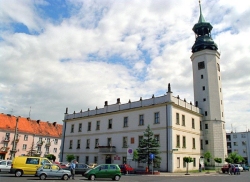
|
Return to Top of page or
return to page 1 of West Poland photos
Return to Photo Album Index.
Go to Travel index.